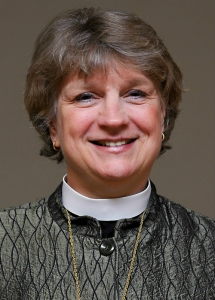 By Bishop Ann Svennungsen
By Bishop Ann Svennungsen
When I was serving a congregation, I often felt that the pace of Holy Week was similar to that of college finals. Three research papers were due (read: sermons) as well as four oral exams (read: leading worship services). Sometimes I felt like it might simpler to pack a sleeping bag and stay in the church that week.
It’s the center of the church year – the days we enter the great mystery of the God revealed in the suffering, dying, and risen Christ. It’s not an easy story. Mark’s gospel tells about Judas who betrayed, Peter who denied, disciples who fell asleep in the garden, and all the disciples who deserted Jesus and fled. And, one of the most haunting phrases speaks about the women “who looked on from a distance.”
“Yes, it’s important to honor and remember this event – but it has become something out of which we expect no more surprises.”
Oh, there’s no doubt that our lives are littered with words like betrayal and denial and falling away. But, it’s the phrase “from a distance” which may most accurately describe our interaction with the passion of Christ. We’d just as soon look at this day, this week, these events, standing “at a distance.”
Oh, we name the week differently than society does. Some call it “spring break” or “March Madness.” We at least call it Holy. Yet, we’re still tempted to keep our distance. And, that’s not just a function of school schedules or keeping up with our brackets.
CRUCIFIXION IS NOT something we want to see up close. Easter preparations can become a distraction. Yet, there’s something else, I think. Perhaps, we use our timelines, our linear view of history, to keep us safely detached. We focus on looking back to something way behind us, something distance from our current life. Yes, it’s important to honor and remember this event – but it has become something out of which we expect no more surprises.
Lutheran theologian and professor of divinity Joseph Sittler writes:
It was all so long ago, and far away;
Each Lent reminds us in word and hymn and sermon.
And we are reminded, too, that point of the remembering
Is not simply, in pity, to remember.
The point of remembering and prayer and work is
To bring together the past and present,
Our predicament and an everlasting Passion.
The connection must be made because
Christ made it.
And thus became God for us and God with us.
God’s power is beyond time, beyond our linear view of history. The life, death, and resurrection is full of surprises, full of power – power enough to change your whole life, to put your sin to death and raise you up to new life in Christ. The Passion is now, for us, for you, even in this moment, full of grace and love.

